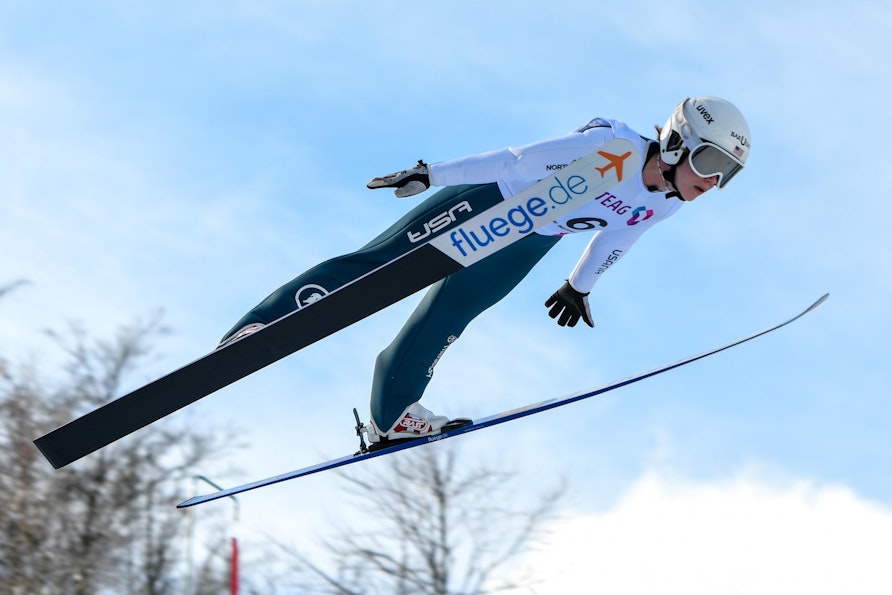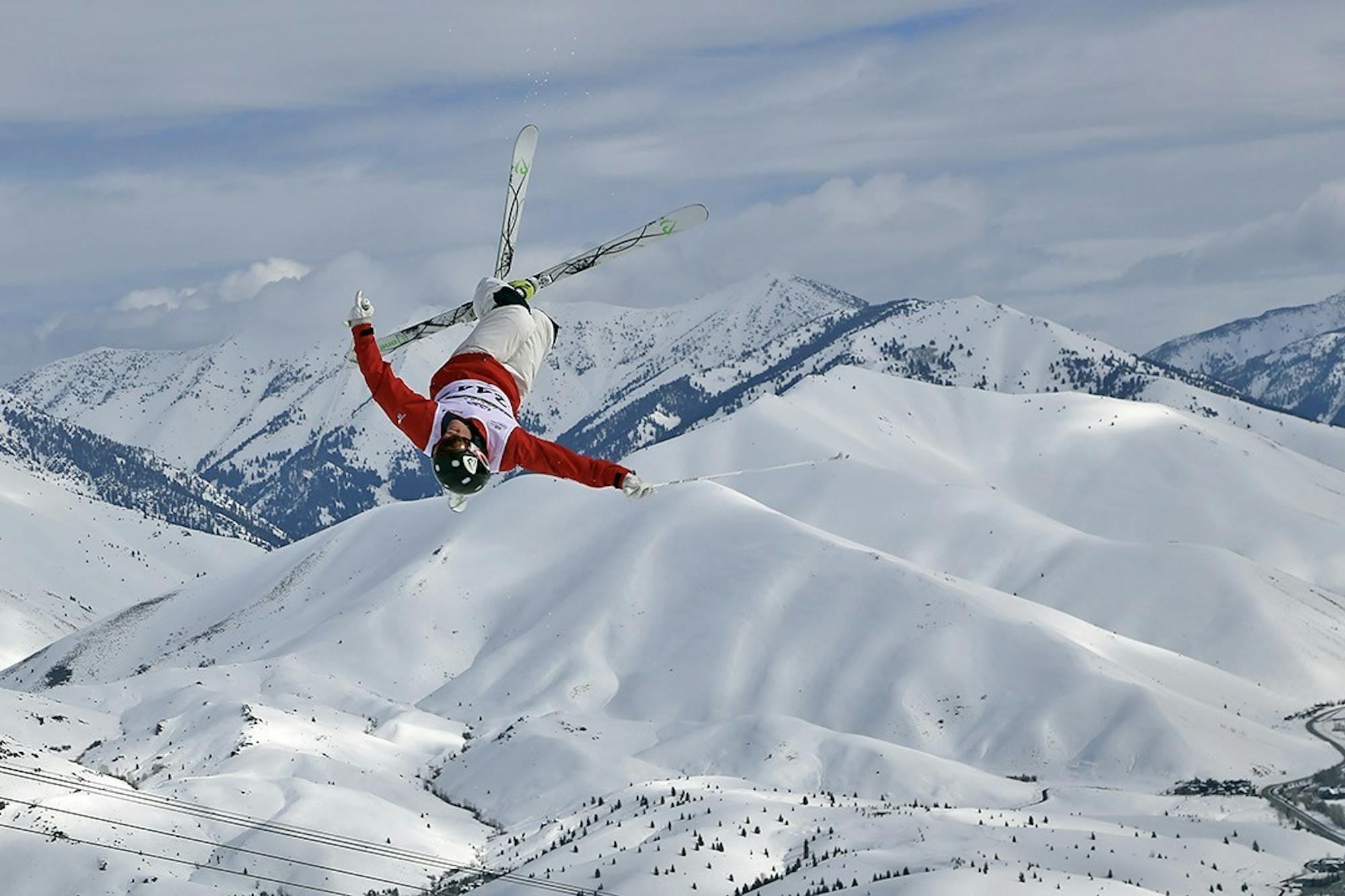It’s not unusual for a Dartmouth student to brush shoulders with an Olympian or Olympic hopeful. Currently, there are six Dartmouth students and alumni skiing in the 2022 Winter Olympics, and several current students ski for the U.S. Team or are otherwise skiing professionally. While they’re competing at such a high level, skiers also need to keep up with their academic lives as Dartmouth students. I sat down with some of Dartmouth’s pro skiers to see how they balance their athletic careers with their academic ones.
Logan Sankey ’20, a ski jumper on the U.S. Team, said that she competes both in the winter and the summer. When she has an upcoming competition, she usually trains Monday through Wednesday, travels on Thursday, and competes Friday through Sunday. She regularly travels internationally to ski and spends most of her year in Europe and Asia. In order to accommodate her rigorous training and competition schedules, Sankey said that she, along with many other professional skiers at Dartmouth, have modified their D-Plans so they don’t need to take classes during their competition seasons.
“Most of us just go on spring quarter,” Sankey said. “You’ll definitely hear that referred to as the ‘twelve year plan.’ So one term a year, or summers sometimes … but the spring is kind of our off-season. I’ve never taken a winter at Dartmouth in all my time here, but then I come back in the spring and get to see everyone, and I dive into classes then.”

Undergraduate dean Natalie Hoyt, who has worked with professional student skiers to assist with their D-Plans, estimates that there are about 20 student skiers who are currently on an adjusted D-Plan.
Successfully executing such a D-Plan is an exercise in planning ahead, according to Brook Leigh ’22. Leigh is a retired professional mogul skier who competed until his sophomore year. He is still involved in the professional skiing world and takes classes for two terms each year, but he leaves a few weeks early in the fall term. He emphasized the importance of finding classes that he will be able to keep up with even after leaving campus.
“You have to be pretty on your game choosing classes and have already talked to know what professors are looking for — which ones are going to be more accommodating than others, which classes tend to get recorded, especially pre-COVID,” Leigh said. “When I knew I was going to have to leave, I would load up on classes that are more textbook-centered, or I knew that they would be big lectures like PSYC 01, which records all their lectures.”
Although a skier’s college experience is untraditional, Jimmy Krupka ’21, an alpine skier on the U.S. Team, is grateful for the opportunity to be able to ski competitively while in college. Still, he recognizes that following an extended D-Plan can be socially isolating at times.
“To me, the pros outweigh the cons; I get to live out a good childhood dream: competing on the world stage,” Krupka said. “But the cons, I’m starting to realize more and more that I’m just going to start feeling older and older at college. And — because school was online, and I only do one term a year — I haven’t been on campus in three years. So everyone I rushed with, all my friends that I made originally, have graduated. So when I go back to campus this spring or summer, I’m going to have to make new friends.”

Although the modified D-Plan can be isolating, there are resources to help support student skiers. Leigh expressed that the Dartmouth community has been “very supportive” of his skiing endeavors. He found that Dean Hoyt’s advising was particularly helpful in navigating through Dartmouth’s bureaucracy.
“When you’re putting in D-Plan petitions and you’re doing a five-plus-year enrollment pattern and you’re changing your housing schedule like all the time, if you get an intro email from Dean Hoyt, and she says ‘this is one of my skiers’ doors just open. And that’s been incredible,” Leigh said.
Professor Douglas Van Citters ’99, the Faculty Athletics Representative to the NCAA for Dartmouth, has advised and taught many professional skiers. He expressed that his job as an advisor is to look at every individual student’s goals, and for professional skiers, that includes helping them progress through their athletic careers.
“College is only one of the things they do,” Van Citters said. “And in fact, in many ways their first commitment is to their sport because unfortunately, we all get old. So sometimes, for some of these athletes, they only have four to six years where they can actually really compete at this very specific level. And so we have to do what we can to support.”
Many student skiers have also found comfort in Dartmouth’s relatively high number of skiers. Leigh expressed appreciation that he has other students to look to for advice related to both skiing and Dartmouth.
“Throughout high school, I was leaving for skiing a lot and I was always having to sort of cut the path, but at Dartmouth, I’m never the first person to do something,” Leigh said. “Having had people to sort of break the trail before me is really nice, and you can tell that the administration values skiers, which makes a huge difference.”
Krupka echoed this sentiment. He said that he is inspired by the accomplishments of other Dartmouth skiers, both academically and in skiing, and he appreciates that he is in an environment where he can be with other skiers that understand his lifestyle and perspective.
“I ended up at a house party at Dartmouth, and I sat down on the couch and next to me was the Olympian Andrew Weibrecht,” Krupka said. “I talked to him for a while and he gave me great advice … about the process of getting better at skiing and what it takes to perform on a World Cup level. He’s kind of who I look up to in terms of making it work with both getting school done and going to the Olympics.”
Even though most of the Dartmouth community does not compete at a professional level, Leigh is grateful that Dartmouth fosters such an appreciation for skiing within its community.
“At a lot of schools, not having that support from the student body and the community wears on you, I think,” Leigh said. “So it’s just so nice to have that, that people get why you would devote your life to skiing at Dartmouth.”
Arielle Feuerstein ’24 is an English major from Bethesda, Maryland. She currently serves as the production executive editor, and in the past, she wrote and edited for Mirror. In addition to writing, Arielle enjoys crocheting, board games and walks around Occom Pond.




